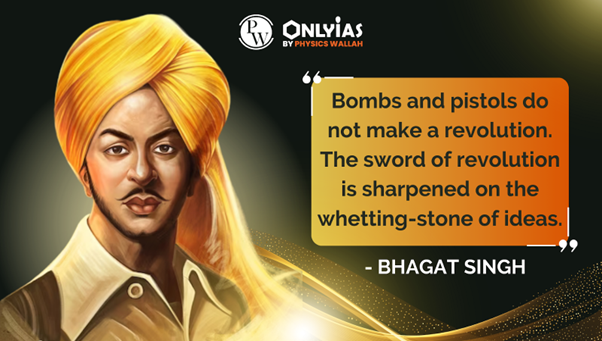Context:
Bhagat Singh: A Young Revolutionary
- Politically Active Background: Both Bhagat Singh’s father and uncle were politically active against the British.
- Contribution by his Father: His father was imprisoned briefly in 1910 for “flooding Punjab with seditious literature”.
- Contribution by his Uncle: His uncle was deported to Mandalay in 1907 for his inflammatory speeches and agitation against the Punjab Colonisation Bill. After his release, in America, he associated with the San Francisco-based Ghadar party.
ALSO READ: INDIAN NATIONAL MOVEMENT PHASES AND LIST FROM 1857 TO 1947
Bhagat Singh As a Scholar and Poet
- Reader & Writer: An eager reader and prolific writer.
- Bhagat Singh often used pseudonyms including Balwant, Ranjit and Vidhrohi.
- Wrote for Newspapers: In the 1920s, he was writing for both Urdu and Punjabi newspapers in Amritsar.
- He also wrote for Kirti, the journal of the Kirti Kisan Party and briefly for the Veer Arjun newspaper, published in Delhi.
- Contribution to Pamphlets: He also contributed to pamphlets and other ‘seditious’ literature criticizing British colonial rule.
- Poetry Liker: His jail notebooks reveal the kind of literature he was reading while in prison, which included poetry by the likes of Rabindranath Tagore, William Wordsworth, Wajid Ali Shah, Mirza Ghalib and Iqbal.

| Book/Publication |
Writer |
- In Bhagat Singh and His Thought (1990)
|
|
- The politics and promise of Bhagat Singh (2019)
|
|
|
|
|
Bhagat Singh as a Marxist
- A Source of his Inspirations: He considered the likes of Marx, Lenin, Trotsky and Bankunin as his inspirations.
- His Ideals: In his final testament, ‘To Young Political Workers’ (1931), he declares his ideal as the “social reconstruction on new, i.e., Marxist, basis”.
- Not with Orthodoxy: However, he did not agree with many orthodox Marxist positions.
Bhagat Singh as an Atheist
- Meaning of Atheist: In 1928, he published a series of articles on anarchism in Kirti, clarifying the meaning of the term for the masses.
- The ultimate goal of Anarchism: Complete independence, this means that they want to eliminate: the Church, God and Religion; the state; Private property.
What are the reasons why Bhagat Singh didn’t believe in God?
- Rationalism and Scientific Outlook: He believed in the power of reason, critical thinking, and evidence-based understanding.
- For him, scientific principles provided a more reliable and logical framework for understanding the world than religious doctrines.
- Socialism and Class Struggle: He was also an advocate of socialist ideals and believed in the need for social and economic equality.
- He saw religion, particularly organized religion, as a potential tool used by the ruling class to control and manipulate the masses.
- His atheism was tied to his commitment to a secular and socialist vision for society.
- Opposition to Dogma and Superstition: He was critical of religious dogma, rituals, and superstitions. He argued that blind faith and unquestioning acceptance of religious doctrines hindered progress and critical thinking.
- Bhagat Singh believed that a society based on reason and scientific inquiry would be better equipped to address social injustices.
- Secularism and Inclusivity: His vision for an independent India was secular and inclusive. He opposed the idea of a theocratic state and believed in the separation of religion from the affairs of the state.
- Atheism, for him, was aligned with the idea of a secular and inclusive society where individuals were free to practice their beliefs without interference from the state.
- Inspiration from Western Thinkers: He was influenced by the writings of Western thinkers, including socialists and atheists. The ideas of Karl Marx, Friedrich Engels, and other socialist philosophers had a profound impact on his intellectual development.
Jinnah’s Advocacy: Bhagat Singh’s Fight Against Unjust Laws
- Best Speeches in the Central Assembly: The British attempted to pass a Bill which would make it legal to conduct a trial in absentia — without the presence of the accused. Jinnah stood against this, delivering one of his best speeches in the Central Assembly on September 12, 1929.
- Passing of Law: The Tribune correspondent wrote at the time. Eventually, the attempt to pass the law was foiled.
- Sentenced to Death: However, Bhagat Singh’s trial went on, under highly problematic circumstances and he was sentenced to death in 1930.
Nehru’s Condemnation: Injustice in Bhagat Singh’s Trial
- Critical of Legal Process: On his hanging judgment, Jawaharlal Nehru was highly critical of the legal process and the injustice perpetrated by the British.
- Supported by Others: Nehru even visited Bhagat Singh in prison, along with other leaders such as Subhash Chandra Bose, Motilal Nehru, KF Nariman, Rafi Ahmed Kidwai, Mohanlal Saxena, etc.
Conclusion
Bhagat Singh, beyond his revolutionary image, was shaped by a rich political heritage, academic prowess, and a commitment to Marxist ideals. His literary contributions, advocacy for atheism, and dedication to a secular and inclusive India reflect a nuanced and principled thinker. The support from leaders like Jinnah and Nehru showcased the widespread recognition of his fight against British unjust laws, leaving a lasting legacy in India’s struggle for independence.
![]() 30 Sep 2023
30 Sep 2023

